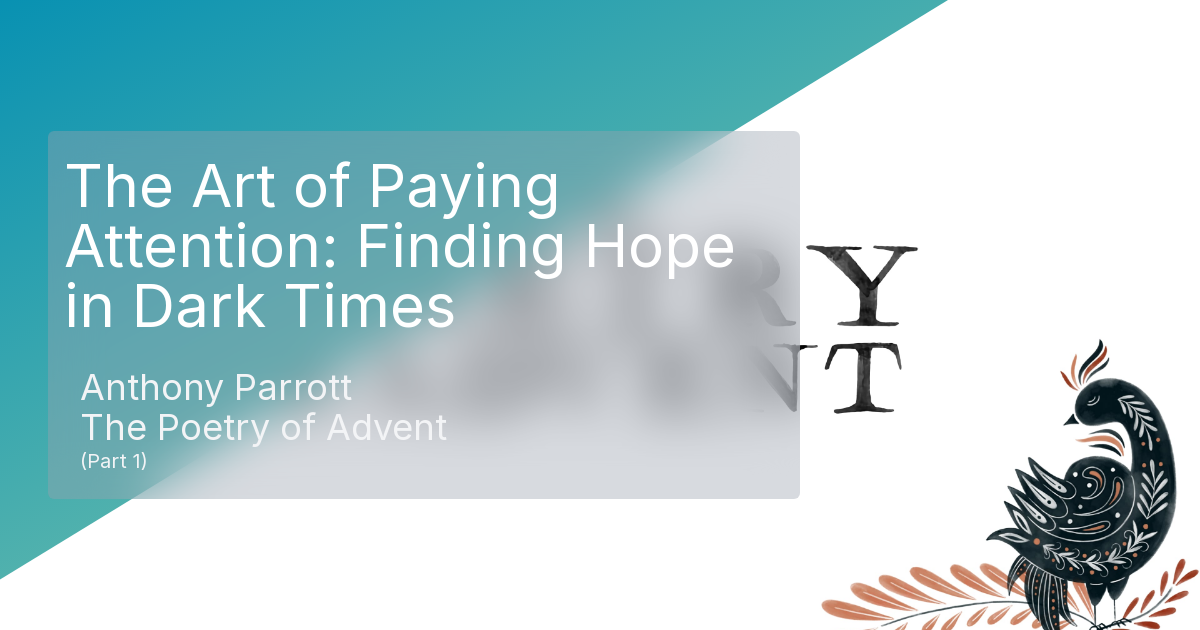In a world engineered to fragment our focus, I've been thinking deeply about the revolutionary act of paying attention. As we enter Advent - the beginning of the Christian liturgical year - I find myself drawn to this theme with increasing urgency.
I was seven years old when someone's attention saved my life.
It was a gas station attendant in Seward, Alaska. My mother, struggling with severe mental illness, was attempting to drive to Cairo, Egypt - a geographical impossibility that made perfect sense in her delusions. We had been living in our car for months, a vehicle inherited from my late grandmother. That day, she proceeded to put oil in the gas tank and gas in the oil tank - a fatal mistake for any engine.
But what strikes me now, decades later, is not the mechanical failure. It's the attendant who noticed. Who paid attention. Who saw a mentally-ill woman and her emaciated son and recognized something wasn't right. Who picked up the phone and called authorities. After seven years of abuse and neglect, that single act of attention changed the trajectory of my life.
Some folks joke about "low-skill" jobs like gas station attendants. Yet here was someone whose attention—their simple presence and willingness to notice‚—altered the course of a child's life. I'll never know their name or full story, at least not this side of heaven. But I will forever be grateful for their act of paying attention.
This is what I think about when I read Jesus's words in Luke 21.
“There will be signs in the sun, moon, and stars. On the earth, there will be dismay among nations in their confusion over the roaring of the sea and surging waves. 26 The planets and other heavenly bodies will be shaken, causing people to faint from fear and foreboding of what is coming upon the world...Look at the fig tree and all the trees. 30 When they sprout leaves, you can see for yourselves and know that summer is near. 31 In the same way, when you see these things happening, you know that God’s kingdom is near.
While many interpret this passage as a prediction about the end times or second coming, I've come to see it differently. Jesus wasn't trying to give his disciples a preview of events two thousand years in the future. He was warning them about something much more immediate: the destruction of Jerusalem, their cultural and religious capital, which would occur within their generation.
But here's what makes scripture enduringly relevant: while Jesus wasn't predicting our current moment, the patterns he described keep repeating. There's always an empire threatening destruction. There's always confusion among nations. There's always surging waves—both literal and metaphorical—threatening to overwhelm us.
And Jesus's response? "Pay attention."
Look at the fig tree, he says. Watch the seasons. Notice the signs. Don't let your hearts become dulled by the anxieties of daily life or the pursuit of pleasure. Stay alert.
This reminds me of Mary Oliver's poetry, particularly her piece "Yes! No!" where she writes:
How important it is to walk along, not in haste but slowly,
looking at everything and calling out
Yes! No!
Imagination is better
than a sharp instrument. To pay attention, this is our endless
and proper work.
Oliver understood what Jesus was teaching: that paying attention is both an art and a discipline. In our current economy, attention is treated as a commodity to be bought and sold. Every vibration in our pockets, every notification on our screens, every advertisement in our field of vision—they're all competing for this precious resource.
Perhaps this is why I find such resonance in J.R.R. Tolkien's writing, particularly the moment when Sam looks up from the shadow of Mordor and sees a star.
The beauty of it smote his heart... and hope returned to him. For like a shaft, clear and cold, the thought pierced him that in the end, the shadow was only a small and passing thing. There was light and high beauty forever beyond its reach.
This is what paying attention can do—it can pierce through despair with unexpected beauty. It can remind us that the cycles of oppression and empire, while real and devastating, are not the whole story. There is always something more, something beyond, something breaking through.
As we enter this season of Advent—traditionally a time of expectant waiting—I'm challenging myself and my community to rebel against the attention economy. To practice the art of noticing. To look for helpers in times of crisis, as Mr. Rogers advised. To recognize that while evil is often predictable and repetitive, but so is mercy—new every morning, predictable in its persistence.
The gas station attendant who saved my life probably never knew the full impact of their attention. Most of us won't. But that's not the point. The point is to keep watching, keep noticing, keep paying attention to both beauty and injustice. To recognize the dance steps of freedom that were choreographed by those before us, and to teach them to those who come after.
Because in the end, paying attention isn't just about survival, though sometimes it is that. It's about hope. It's about witnessing both the shadow and the light that pierces it. It's about choosing, deliberately and repeatedly, where to focus our gaze in a world designed to distract us.
As William James wrote—
The faculty of voluntarily bringing back a wandering attention, over and over again, is the very root of judgment, character, and will.
In this season of anticipation and hope, may we all cultivate this faculty. May we have eyes to see and ears to hear. May we pay attention to what matters most.
The above was based off of my 200th sermon for the first week of Advent 2024. You can find the whole thing below:








Discussion